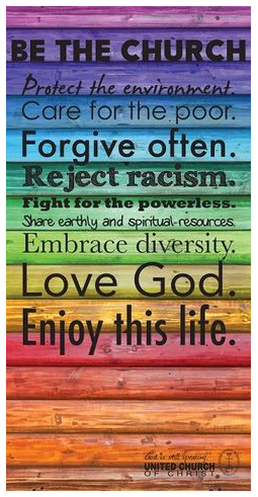 uccresources.com/collections/be-the-church uccresources.com/collections/be-the-church When people come into a progressive church setting one of the most liberating and, for some, unsettling things is the lack of a set creed. Many churches and denominations put their beliefs, often in the form of a creed, right up front. They continue a long tradition within Christianity of identifying “the faith” with “a certain set of orthodox beliefs.” Since the Reformation, we are used to the idea that one group’s “orthodox beliefs” might differ significantly from anther group’s “orthodox beliefs,” but in general the idea that a church is defined by its beliefs has reigned unchallenged. Matters of governance, ethics, relationship with the broader society, liturgy, hymnody and discipline all have generally been regarded as secondary to beliefs. Some people find the lack of a creed as highly freeing, since they are now free (and responsible) to think for themselves. They are liberated from authority figures determining the bounds of their thinking, and can pursue the things they have wondered about. Sometimes they find resolutions, other times one question leads into yet another and another. At times, they then want some guidance to navigate the wide-open spaces, and here is where the challenge begins. The response to “So, what do you believe?” is often quite awkward, because “belief” is not the chief marker or binder of our life together. We generally regard statements like creeds to be “testimonies of faith” rather than “tests of faith.” That is, they are benchmarks showing us what the best thinking and faith work of our ancestors accomplished for their time and place, but are not something we are required to conform to in our time and place. Creeds can be good to know about, since they show what questions vexed our forbears, can alert us to potential dead ends, and provide us helpful tools and categories for our own inquiry. We are often clearer about what we do not believe than what we do believe. So progressives generally disbelieve in “miracles,” which puts traditional doctrines like the Exodus, Virgin Birth or Resurrection into a bin marked “rethink, retool or reject.” We often do not believe in an interventionist God, who “suspends the laws of nature” at times, which puts traditional understandings of prayer into question; we find answers to prayer not in radical results but in renewed relationship with God. We are suspicious of claims of special revelation, whether for the inspiration of the Bible or the authority of church leaders, which raises keen questions of how we discern and value religious authority in self and others. Moreover, the whole discussion of belief in this or that doctrine seems quite beside the point: We are constituted as a community not by believing together but by working together. We have found that we can work to end homelessness without agreeing on whether Jesus turned water into wine or Welch's. We can work to prevent war, and end the ones we are engaged with, without agreeing whether to immerse adults or sprinkle babies for baptism. We can open our doors to the immigrant, stranger and alien “because you were once slaves in Egypt” (Leviticus 19:24, etc.), regardless of whether we regard the sojourn in Egypt and Exodus as historical or metaphorical (or whether we are of Israelite descent). Many times the question is not so much “What do you believe?” as “How do you believe?” What is the motivation for your beliefs? Do you believe this or that doctrine so you can be “right” and someone else “wrong”? Even “liberals” can have “fundamentalist” spirits. Do you believe something so you can draw a bright line between you and the non-believer? And then assume that God will bless you and curse them? But then, “What about the people who I love who are on the wrong side of the church’s bright line?” This is the root cause of so many people who sadly walk away from the church, for they cannot believe that God’s love is so narrow that God refuses to love someone that they are quite able to love. If you scratch at the surface of our working together, you will likely find some common beliefs we do share. We welcome all people because we see no exceptions in “God so loved the world, that God gave the only Son so that everyone who believes in him may not perish but may have eternal life” (John 3:16). We value our fellow human because we are all made in the image and likeness of God and therefore have value like God’s (Gen. 1:26, 9:6, etc.) We are trying to figure out in practical ways what it means to “love God… and our neighbor as our selves” (Mark 12:30, Romans 13:9, etc.). We share responsibility for the ecological health of our planet, to manage it wisely for future generations (Gen. 1:28, Psalm 24:1, etc.). We try to emulate Christ, not as king and ruler, but as servant (Philippians 2:5ff, John 13:1-17). In all these cases, we are working our way into belief, not believing our way into behaving. Just as if you want to feel in love with your beloved, you don’t introspect and try to drum up certain feelings, you do good and kind and thoughtful things for them, and the feelings follow. At core, love is a verb rather than an affection; so is faith. So maybe the question is not “What do you believe?” or even “How do you believe?” but “What do you love?” If we drill down to Jesus’ Great Commandment, that gives us two great objects: God and Neighbor. There will be lots of room for different beliefs about who God is and how we know God, and there may be a lot of different actions to love our Neighbor.* But by focusing on our common work together, we can create the sort of community where there is space to discuss how God has drawn us together for such action. What would the church be like if its theology had been created not in the classroom over the philosophy textbook but in the company break room, the factory union hall, the immigrant’s detention center, or the homeless encampment? Peace, Rev. Dr. Mark Lee *Not every answer to these questions will be right: there are ways to go clear off the rails. Recall that the Inquisition claimed it was loving the neighbor by torturing them to get right with G*d as the Inquisitors understood him. But how to discern what is true of God and loving towards neighbor is a discussion for another day. AuthorThe Rev. Dr. Mark Lee brings a passion for Christian education that bears fruit in social justice. He has had a lifelong fascination with theology, with a particular emphasis on how Biblical hermeneutics shape personal and political action. Read more about Mark. The Holy ONE is my shepherd, I shall not want. I am led to green pastures and beside still waters; My soul is restored and I am set on right paths Even though I walk through the darkest valley, I fear no evil; for you, Holy ONE are with me; your rod and your staff — they comfort me. You prepare a table before me in the presence of my enemies; you anoint my head with oil; my cup overflows. Surely goodness and mercy shall follow me all the days of my life, and I shall dwell in Your house my whole life long.  I am reminded of the changes of life this week as the Summer Solstice, our longest day of light in the Northern hemisphere, arrives on Friday. Astrologically it is the first day of summer though weather and calendar wise we often think of June 1 as the first day. I am barely used to summer weather and already after Friday the days will begin to shorten just a bit each day till we reach the Winter Solstice. Our most ancient ancestors intimately knew these astrological changes. These changes indicated growing seasons and harvest, times to be fallow, times to seek shelter from storms, times to celebrate, times to mourn, times to pray. Whether we measure our seasons astrologically or meteorologically, by calendars, or by work or school schedules, we live our lives in the midst of change. Each day is a series of changes in light, time and activity which we move through almost without thinking. So we could choose to be very open to all kinds of change as it comes to us. Life is change. And yet we are likely to be resistant to any change that brings even a hint of discomfort, any change that invites a new way to move through one of our routines, any change that rearranges the status quo of a beloved community. Some changes, such as illness, death, divorce, moving are so large that they bring understandable grief. Other changes come that are just not “the way things used to be done” or the way they “should be done because they have always been done this other way.” These changes can stretch us as much as the ones that bring us grief. In his book, Quietly Courageous; Leading the Church in a Changing World, Gil Rendle writes of the changes challenging the church in our times. Those of us who were around in the last part of the 20th century experienced a convergent culture during and after World War II. This was a time in America when the people tended to converge, pull together to work for the common good of the country, of the community, the church, the family. This was a culture of joining institutions that built community through the joys and responsibilities of membership. The flip side, of course, was that important differences were swept under the rug so as not to rock the status quo. As the 20th century wound down starting in late 60s, our culture shifted to a divergent culture. In a divergent culture the social contract moves from seeking membership in societal institutions to seeking individual well-being. Now in the 21st century “the correct way to get on with life is to recognize that each of us has the right to live as he or she pleases so long as we do not interfere with the right of the other people to do likewise.”[i] The celebration is that differences are no longer swept under the rug but are free to be expressed! Historically, strong churches have been built with the social contract of a convergent culture, the culture of the group. But that time has gone. Now we live as the church in a culture of the individual. This is neither good not bad....it just IS. It is the cultural change that we are dealing with as church in the 21st century. We can no longer just say, “The problem is membership. There must be a specific solution from back in the day, from the way we used to do things. If we just return to _______ (fill in the blank), we can rebuild our church membership.” We are learning to say, “Here is our new situation in this new divergent culture. Let’s bring together all our diverse ideas and seek God’s ideas for our changing times. What are the new ways, maybe, some old ways, and more importantly, ways we haven’t yet encountered in which God is leading us to be and build the Body of Christ in the world?” Rendle’s book encourages us to be “quietly courageous” as we lead one another into the future. I paraphrased Psalm 23 at the beginning of this reflection because it is a song of encouragement for quiet courage, a song that reminds us that through all changes God accompanies us. We are never left alone! As you move through the changes of your life, as we change and grow at Plymouth, may we always remember the “Accompanying God” of this psalm. I also leave you with words from a prayer by the late William Coffin, a former pastor of Riverside Church in NYC and a former chaplain at Yale University. O God, whose mercy is ever faithful and every sure, who art our refuge and our strength in time of trouble, visit us.... We need a hope that is made wise by experience and is undaunted by disappointment. We need an anxiety about the future that shows us new ways to look at new things, but does not unnerve us... [ii] May the words of the psalmist and the words of the pastor send you forth into the inevitable changes of life “with a gladsome mind, free and joyful in the spirit of Jesus [the] Christ!”[iii] Blessings, Jane Anne [i] Gil Rendle, Quietly Courageous; Leading the Church in a Changing World, (Rowman & Littlefield, New York, NY, 2019, 46.) [ii] Ibid., 10. [iii] Ibid., 11. AuthorThe Rev. Jane Anne Ferguson, Associate Minister, is a writer, storyteller, and contributor to Feasting on the Word, a popular biblical commentary. She is also the writer of sermon-stories.com, a lectionary-based story-commentary series. Read more I thought a lot about Going Deeper, our Plymouth annual theme, as I met with colleagues and delegates at the Rocky Mountain Conference Annual Meeting (now called Annual Celebration) in Grand Junction last Thursday through Saturday. And I thought about the Conference’s idea that all of our churches, which span Colorado, Wyoming, and Utah are radically connected. “Radical” comes from the Latin radix, which means root, so radical connection means that our roots are intertwined. And we’re even more than connected…like a clone of aspen trees, we share the same DNA. We are all part of the church universal, the UCC, and the Rocky Mountain Conference. Our congregations include a rural church with a handful of members and is lay-led because they cannot afford to pay a part-time pastor, a Samoan immigrant church, and a Japanese-American Church … all in Utah, a church in Wyoming with 100 members that still manages to send more than 10 percent of its annual operating expenses for Our Church’s Wider Mission – which is how we support the mission and ministry of the Rocky Mountain Conference and the UCC both domestically and abroad. It is tough work to do ministry in these churches! One of the things that thrilled me most (beside hearing our keynote speaker, John Dominic Crossan) was our two amazing conference clergy: Sue Artt, our conference minister, and Erin Gilmore, our associate conference minister (who grew up here at Plymouth and is Sally and Terry Gilmore’s daughter). Sue and Erin provide phenomenal conference leadership! They are gifted and grace-filled clergy leaders, and we are blessed to have them! They are not afraid to think outside the box, to try new things, and to step back and ask what God is doing in the midst of our churches. And if that wasn’t enough, our wonderful conference and retreat center in the Black Forest, La Foret, is not only out of debt, but has new energy and new programs thanks in large part to Larry McCulloch (one of our members at Plymouth), who serves as executive director. Being the church in the 21st century is a challenge, but you are making a palpable difference in making it possible! Because of your generosity, Plymouth’s giving to Our Church’s Wider Mission is number one in the Rocky Mountain Conference! You are enabling conference staff excellence and leadership and making it available to smaller churches who don’t have the same resources we do at Plymouth. Through OCWM Basic Support and the four special offerings of the UCC and other denominational support, last year we gave over $115,000! Way to go, Plymouth! You may never meet a Samoan UCC family living in Utah or see the work Sue and Erin do in revitalizing small churches or see the transformed lives of campers at La Foret, but rest assured: your giving is changing lives. Thank you for your generosity and for your commitment to the vision of the progressive church in our region and in God’s world. We are all part of the same cluster of trees, and we are interdependent not only on each other, but on the grace of God to keep us growing. Gratefully, P.S. Thanks to our lay delegates: Vicki & Wendy Thompson and Nic Redavid! And thanks to the 30 Plymouth folks who demonstrated against gun violence in Old Town Square Sunday afternoon! AuthorThe Rev. Hal Chorpenning has been Plymouth's senior minister since 2002. Before that, he was associate conference minister with the Connecticut Conference of the UCC. A grant from the Lilly Endowment enabled him to study Celtic Christianity in the UK and Ireland. Prior to ordained ministry, Hal had a business in corporate communications. Read more about Hal. 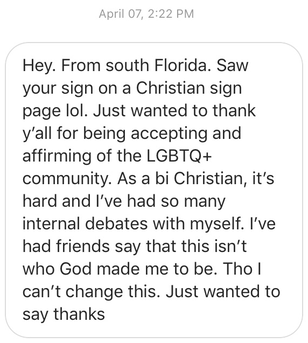 “Do the rainbows come off… you know, for funerals and stuff like that?” “I bet that [the rainbow on the new sign] was your idea…[wink]” The variety of names is vast: Open and Affirming (ONA), Reconciling in Christ (RIC), Welcoming Communities Network (WCN), Believe Out Loud Parish, More Light, Covenant Network, Affirmation, etc. Whatever you call it doesn’t really matter. We don’t really care what it is called. We care how it behaves. What matters is the theological risk you are willing to take to safeguard a community that is more out than ever... and therefore more vulnerable than ever before. The more out we are as LGBTQ Christians, the more reactionary current politics, the more we need the Open and Affirming movement to continue and deepen. With the regression of rights and safe spaces around the world, especially from the highest levels of power, the Open and Affirming movement is only just getting started. Likewise, the durability of the movement is only now being tested. It is no longer just about Marriage Equality and “love is love.” That was easy! Now it is about our whole identity together as Christians. Plymouth has been Open and Affirming since 2001, offering a generous welcome and affirmation to the LGBTQ Community in Fort Collins and serving as a beacon for the LGBTQ-Affirming Church movement across our entire region. As a congregation, we have changed many lives including my own. This openness and affirmation were put to the test in 2005 when a lost and scared Evangelical high school Sophomore walked in. As a 16-year-old standing in front of Plymouth, covenanting and joining on my own as a young gay kid; as a young gay adult being accepted as a Member in Discernment in front of our loving board of deacons; as a gay seminary graduate being affirmed as Ordainable by unanimous vote of the Association; as a gay Candidate presented to the congregation for Call as Settled Associate Minister; and these nearly five years as your out gay often-rainbow-clad Associate Minister, mentioning my husband (intentionally) in almost every sermon--I have experienced nothing but the bold and manifest love of my Creator and God through this church, its members, and staff. When out in the community, I always know that these nearly 700 Christians and their faith in me as pastor have my back. Can you imagine the blessing you have been in my life and in the lives of others like me? While I understand that the UCC generally dislikes its ministers to serve their home churches, this ministry has always felt like the completion of wholeness and even Providence. What came as a surprise to me this year was the reactions some in our congregation had, initially, when we first installed our new signs. There were many reactions. It is one thing to be Open and Affirming, but does the sign really need to state it that loudly every day of the year with the large rainbow flag? Does the rainbow come off for funerals, when more conservative members come home? The funniest assumption, since I didn’t have anything to do with the design of the sign, was that the rainbow was all my doing. (I wish I could take credit for it, but I sadly wasn’t on that committee.) In summary, what surprised me was the shock some had at being publicly outed as members of an Open and Affirming LGBTQ-Celebrating Congregation. What would their friends think? Would this put us in danger as a congregation? Can we feel safe in a church that has outwardly marked itself with a rainbow? What I found was a fear, in this violent world, to be more out than we already are—especially with such great visibility on Prospect! This could expose us to more violence. Shouldn’t we stay quiet? As someone with no choice but to live every single day out and proud, this fear surprised me. What was it about the sign that made people uncomfortable? Plymouth is now where Pride Month is every month. It is one thing to allow us to be members, to be your clergy, but it is another to actively counter the dominant culture with a symbol of equality on our sign. It is a sign that not only are LGBTQ people welcome at Plymouth, but we have equal standing and ownership. For me, as a gay man, I feel much safer in a church with a rainbow on it. I found it fascinating that for some straight members, they felt exposed and in danger with the rainbow outside. I wasn’t upset by this. Rather, I felt deeply for them. I felt for them because my body has felt like that rainbow at times. I didn’t judge that fear because that is the fear that LGBTQ people experience every day of our lives. We work hard, intentionally, and with humor, love, and abundance to overcome it in community, art, and Pride. We get it. We understand fear. Gospel: The fear has gone away over the past year, and a new confidence has emerged in the signs and what they say about us. Plymouth has chosen to go to the next step of Open and Affirming. We are now Open and Celebrating without fear! You, Plymouth, have made the step that the whole of humanity is called to make from passively affirming to active celebration with the Spirit. A year ago for Pride Month, I wrote a reflection called, "The LGBTQ Right to Distrust God." So this year… I am offering a counter point to my own letter: "Why the LGBTQ-Celebrating Church Matters in 2019." This is why it matters that we have the rainbow outside and that we continue to pay attention to our Open and Affirming Covenant. Our ministry as an Open and Affirming Church is bigger now than Fort Collins. With Social Media, our ministry and mission are bigger than our immediate market. Upon posting a picture of our sign online on Instagram (@plymouthuccftc), we were picked up and reposted by a church sign blog. It caused a lot of commotion and thousands of responses, but it was an email from a Floridan that caught my attention: “Hey. From south Florida. Saw your sign on a Christian sign page lol. Just wanted to thank y’all for being accepting and affirming of LGBTQ+ community. As a bi Christian, it’s hard and I’ve had so many debates with myself. I’ve had friends say that this isn’t who God made me to be. Tho I can’t change this. Just wanted to say thanks.” 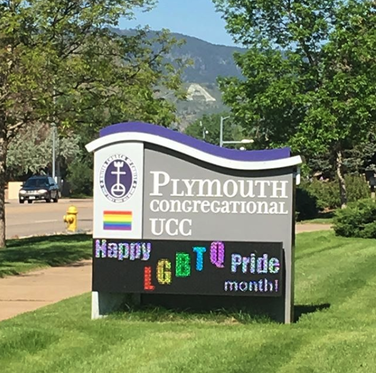 Even if the $60,000 we spent on the new signs changes one life, saves one life, opens one mind, transforms one heart… wasn’t it worth every single penny? Here are the reasons why the LGBTQ-Celebrating Movement and Visibility Matters More than Ever in 2019:
Do the rainbows come off? No, I’m sorry the rainbows don’t come off anymore. The Church doesn’t have the luxury of time to go in and out of celebrating all people anymore. This is the time in the institution of Church (more than ever before over these 2,000 plus years) to know who we are and to proclaim it boldly. While the Open and Affirming movement started as a Safe Space and a Sanctuary saving LGBTQ people from hateful churches and an uncertain world, it is now the LGBTQ Community arguably saving the Church from meaninglessness and theological daftness in an increasingly secular world. The Open and Affirming Church has given meaning to so many lives like mine. Now, we hope to be co-celebrants with you in a world seeking deeper meaning. Celebration, more than fear, is something we do well in the LGBTQ world. My prayer is that we can offer that joy to the Church and save it. Plymouth, thank you for being Open and Affirming and for making the bold move to Celebration. In Pride, The Rev. Jake Miles Joseph (or just Jake) Preferred Pronouns: He/him/ his AuthorThe Rev. Jake Miles Joseph ("just Jake"), Associate Minister, came to Plymouth in 2014 having served in the national setting of the UCC on the board of Justice & Witness Ministries, the Coalition for LGBT Concerns, and the Chairperson of the Council for Youth and Young Adult Ministries (CYYAM). Jake has a passion for ecumenical work and has worked in a wide variety of churches and traditions. Read more about him on our staff page. |
Details
|


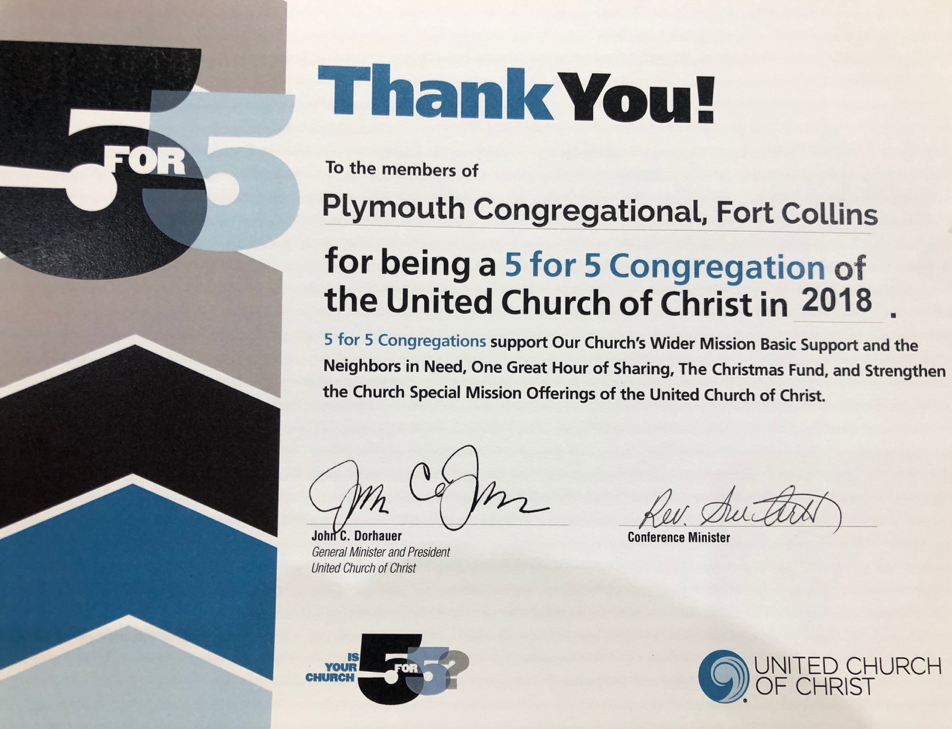
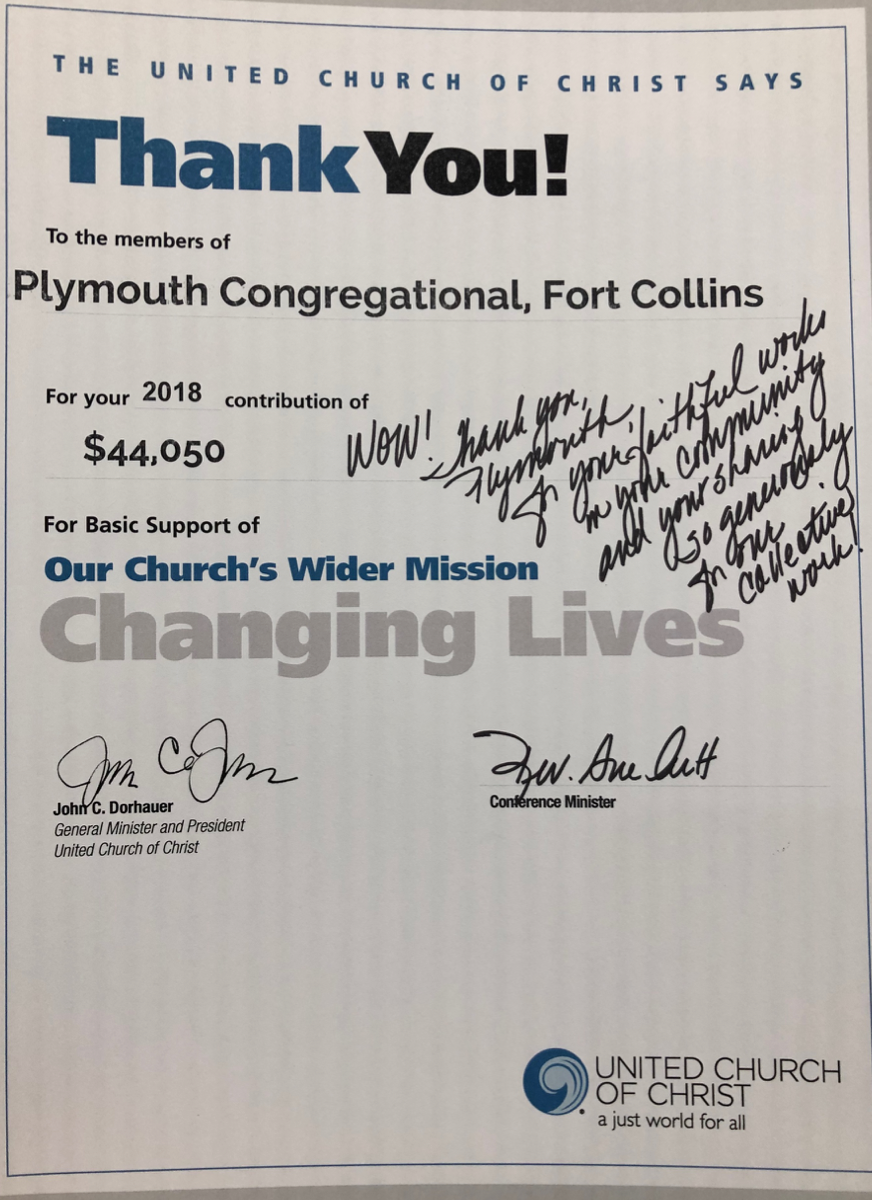
 RSS Feed
RSS Feed